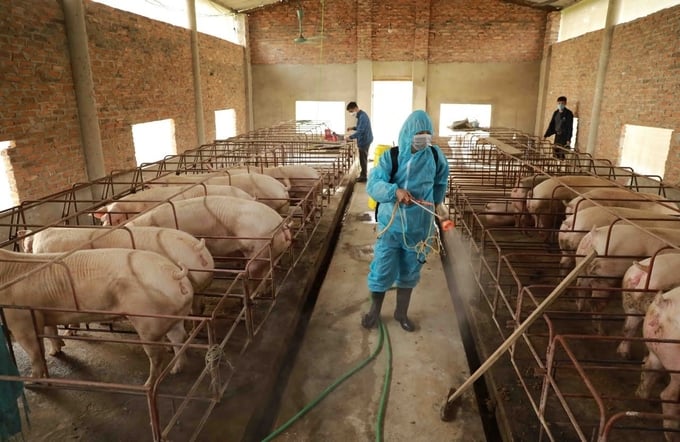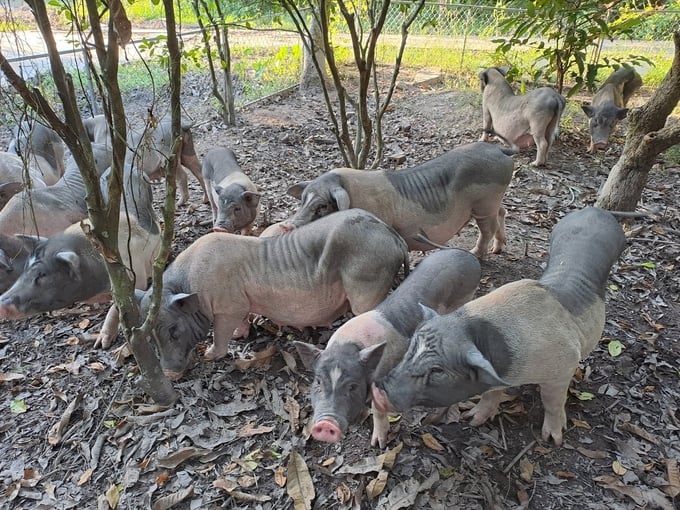June 19, 2025 | 02:08 GMT +7
June 19, 2025 | 02:08 GMT +7
Hotline: 0913.378.918
June 19, 2025 | 02:08 GMT +7
Hotline: 0913.378.918

The functional units are conducting pesticide spraying and disinfection of livestock farms. Photo: Nguyen Thanh.
African swine fever exhibits a quick spread and impacts pigs of all types and ages, resulting in an almost complete fatality rate. The virus responsible for the sickness can be found in the blood, organs, and secretions of pigs that are affected. It exhibits a high level of resistance, capable of enduring low temperatures, and can persist in raw pork or at moderate temperatures for 3-6 months, but turns dead at a temperature of 70 degrees Celsius.
Given its significant resistance, the virus can spread extensively and persistently across a broad geographical region, utilizing many transmission pathways that are challenging to manage, and there is yet no viable remedy. When the presence of infected pigs is identified, it is imperative to comprehensively tackle the outbreak in a limited, confined region prior to its dissemination.
At present, the Ministry of Agriculture and Rural Development recommends a vaccine for disease prevention in pigs intended for meat production. However, it is crucial to administer the vaccine under stringent supervision. In 2023, multiple provinces carried out experimental vaccinations and are currently assessing their efficacy.
"We regularly apply lime and disinfect the barns bi-monthly, monitor the feed, and subject the pig's food to cooking prior to feeding. Furthermore, cooperative members are taking measures to restrict movement to infected areas and prevent outsiders from entering the barns in order to safeguard the livestock during the widespread outbreak," Ms. Lien emphasized.

The Mong Cai pigs of Van Thinh Phat Cooperative are raised according to strict disease prevention procedures. Photo: Nguyen Thanh.
Directive No. 2080, issued by the Provincial Party Committee and the Provincial People's Committee, addresses the prevention, control, and management of African swine disease within the province.
Hence, departments, agencies, localities, organizations, and pig farming households must prioritize the prevention and control of African swine fever. This becomes particularly crucial during unpredictable weather fluctuations that compromise the livestock's immunity, thereby facilitating the growth of pathogens.
Localities must gather materials and chemicals and use all available resources to promptly execute measures to control the pandemic. The objective is to promptly isolate and eliminate outbreaks, effectively manage the situation, preempt the occurrence of subsequent outbreaks, and completely prevent broad transmission. Arrangements should be put in place to promptly recommence pig husbandry once the disease is effectively managed.
A combined quantity of 4,770 liters of chemicals and 29 tons of lime powder has been allocated and employed for the purpose of disinfection and environmental sanitation. This measure aims to restrict the occurrence and transmission of disease-causing agents in farming households, animal markets, and slaughterhouses, as well as to manage any outbreaks that may arise.
In order to manage and confine the outbreak, the Department of Agriculture and Rural Development consistently provides reports and recommendations to the Provincial People's Committee, urging local authorities to promptly allocate manpower and resources to control and confine African swine fever.
The authorities are enhancing the scrutiny and regulation of vehicles that transport animals, with a particular focus on those carrying pigs. They are also taking harsh measures to address any infractions. The current focus is on teaching and providing guidance to homes and farms on how to effectively close their barns, control potential sources of the African swine fever virus, and improve the implementation of biosecurity measures.
In addition, it is advisable for farming households to regularly employ lime powder and chemicals for disinfection purposes, not only within pig farms but also in the surrounding high-risk areas. It is important to sanitize individuals, transportation vehicles, and farming tools. Furthermore, it is recommended to refrain from importing breeding stock from infected regions and to avoid introducing new animals or restocking until the epidemic has been officially declared over. Additionally, it is advisable to minimize visits to farms and to avoid organizing direct meetings with farm owners and farmers to mitigate the risk of disease transmission to livestock areas.
As of June 9, 2024, the Department of Animal Health has reported that African swine fever has been detected in 392 communes and 148 districts across 40 provinces and cities. A total of 17,723 pigs have been euthanized, with the largest numbers in the provinces of Bac Kan, Lang Son, Son La, and Ba Ria-Vung Tau. As of June 9, 2024, there are now 199 ongoing epidemics in 199 communes/wards, 63 districts/towns/cities throughout 18 provinces/cities that have not yet exceeded 21 days.
Translated by Linh Linh

(VAN) To address plastic pollution, closing the plastic recycling cycle will bring significant economic and environmental benefits.

(VAN) According to the Binh Thuan Department of Industry and Trade, in the first five months of 2025, Binh Thuan's dragon fruit export turnover increased by 20.65% compared to the same period last year.

(VAN) EU countries on Thursday gave final approval to new tariffs on fertilizer imports from Russia, a move aimed at cutting off revenue that could support Moscow’s war in Ukraine, despite concerns from European farmers.

(VAN) The working delegation from the Ministry of Agriculture and Environment conducted an important trip to the Netherlands to strengthen strategic partnerships and sustainable development in the agricultural sector.

(VAN) The letter ‘A Plea from the Ocean’ not only evokes emotion but also awakens the human conscience to the responsibility of protecting life on Earth.

(VAN) The Department of Agriculture in South Africa has announced the country’s first mass vaccination of poultry to prevent local birds from contracting avian influenza.

(VAN) Establishment of the Mekong Delta Regional Agricultural Linkage Center, aiming for a closed value chain, deep processing, trading platforms, and international market connectivity.